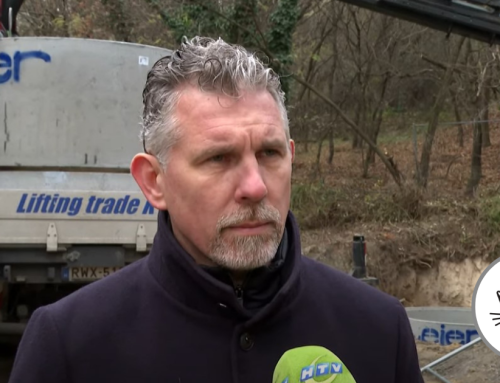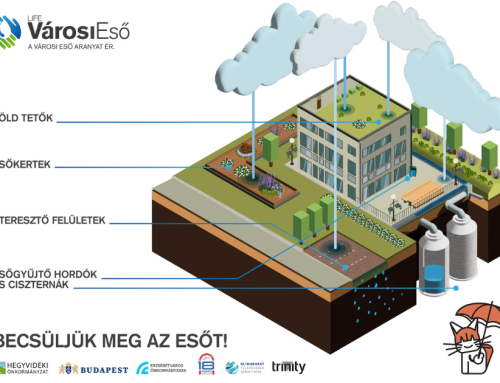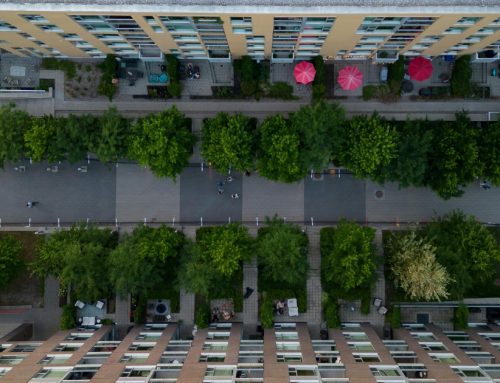Mostanra egyre szélesebb körben válik evidenciává, hogy a klímaváltozás következtében fellépő vízhiány miatt a csapadékvízre értékként, természeti erőforrásként kell tekintenünk. Ezt tartja szem előtt a Városi Eső projekt is, amelynek keretében az alábbiakban azt mutatjuk be, hogy milyen törvényi és szabályozási hiányosságok nehezítik a csapadékvíz-kezelést – nem csak a közszolgáltatók és az önkormányzatok, hanem a lakosság esetében is.
Az újszerű, egységes szemléletű csapadékvíz-kezelés Budapesten még megoldandó feladat. Ennek hátterében egy komplex problémakör áll, aminek a megértéséhez mindenekelőtt a csapadékvíz-kezelést kiszolgáló infrastruktúrát kell megismernünk. A vízelvezetés Budapesten kétféle rendszerben történik: egyesített és elválasztott rendszerben. Az elválasztott rendszer lényege, hogy a szennyvíz és a csapadékvíz külön csatornákban halad, így a csapadékvíz – ha jó helyre juttatjuk – felhasználható (pl. öntözésre). Az egyesített rendszerben a szennyvíz és a csapadékvíz keveredik, az értékes csapadékvíz így egyenesen a szennyvíztisztító telepekre vagy vízfolyásokba kerül, tehát gyakorlatilag kárba vész.
Alapvető probléma, hogy a csapadékvíz-elvezető hálózat a jelenlegi szabályozás értelmében nem minősül (vízi)közműnek. Miért gond ez? Azért, mert így nem szedhető rá szolgáltatási díj, a közműszolgáltató tehát nem jut megfelelő forráshoz a csapadékvíz-elvezető hálózattal kapcsolatos feladatok elvégzésére (pl. csapadékvíz-elvezető csatornák tisztítása). Budapesten tovább nehezíti a helyzetet, hogy a kerületek nagy része a Fővárosi Csatornázási Művektől (FCSM Zrt.) várná a csapadékvíz kezelését, az FCSM Zrt. viszont – mivel a csapadékvíz elvezető rendszerek nem víziközművek – nem tekinti feladatának azok üzemeltetését. Az FCSM Zrt. az újonnan épülő csapadékvíz-elvezető hálózatokat sem veszi át üzemeltetésre, ugyanakkor a jelen szabályozás szerint egyesített hálózat nem építhető. A fő gond tehát az, hogy a szabályozási környezet miatt jelenleg senki nem foglalkozik érdemben a csapadékvizek kezelésével.
Ezt a gordiuszi csomót elsősorban törvény- illetve jogszabálymódosítással lehet feloldani: a csapadékvíz-elvezető rendszereket víziközművé kell nyilvánítani, így rendezhetővé válna az a kérdés, hogy hol ki felel a csapadékvíz-kezelésért, illetve megoldható lenne a finanszírozás is. A vízgazdálkodási törvény (1995. évi LVII. tv. 6 §)szerint az ingatlan tulajdonosa felel az odahulló és a telken maradó csapadékvíz kezeléséért, azonban ez a sűrű és a régebben megvalósult beépítések miatt műszakilag sok esetben nem megoldható. Az ingatlanok felől közterületre érkező csapadékok esetében a szabályozás során meg lehet határozni azt az arányt, hogy a közszolgáltató milyen mértékig vállalja annak kezelését. Ideális esetben a tulajdonosnak a terheléssel arányos hozzájárulást kellene fizetnie a közműszolgálatótnak (?). Ezt az indokolja, hogy a közterületre lehulló vagy magánterületről oda folyó csapadékvizek elvezetése közérdek, ezért közszolgáltatásnak tekinthető, továbbá a magánterületről érkező csapadékvizek mennyiségét az ingatlanok tulajdonosai befolyásolják. A törvény-és jogszabálymódosítások mellett tehát fontos a lakosság és a vállalatok szerepvállalása is: el kell érni, hogy az ingatlantulajdonosok felelősségük tudatában minél kevésbé hárítsák a szolgáltatóra, az utak kezelőjére, az önkormányzatokra a csapadékvíz elvezetésének problémáját, és igyekezzenek minél inkább a telkükön, helyben hasznosítani az esővizet.
A csapadékvíz-gazdálkodást érintő legfontosabb érvényben lévő jogszabályok:
A vízgazdálkodásról szóló 1995. évi LVII. tv.; A víziközmű-szolgáltatásról szóló 2011. évi CCIX. törvény; az Országos Településrendezési és Építési Követelményekről szóló 253/1997. (XII. 20.) számú kormányrendelet







Hagyj üzenetet